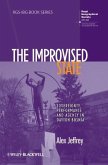Offering a rare glimpse of rural life in modern-day Cuba, this book examines how ordinary Cubans carve out their own spaces for 'appropriate' acts of consumption, exchange, and production within the contradictory normative and material spaces of everyday economic life.
Discusses the conflict between the socialist-welfare ideal of food as an entitlement and the market value of food as a commodity
Bridges the fields of human geography and anthropology
Approaches food networks and the scale of food systems in a novel way
Provides a comprehensive look at Cuba today, with coverage of history, politics, economics, and social and environmental justice
Enhanced by vivid photos from the field
Hinweis: Dieser Artikel kann nur an eine deutsche Lieferadresse ausgeliefert werden.
Discusses the conflict between the socialist-welfare ideal of food as an entitlement and the market value of food as a commodity
Bridges the fields of human geography and anthropology
Approaches food networks and the scale of food systems in a novel way
Provides a comprehensive look at Cuba today, with coverage of history, politics, economics, and social and environmental justice
Enhanced by vivid photos from the field
Hinweis: Dieser Artikel kann nur an eine deutsche Lieferadresse ausgeliefert werden.
'Wilson provides a hugely important corrective to our tendency to take for granted the dominant systems of food production, exchange and consumption. Her ethnographic account of how ordinary Cubans live and link two coeval economic systems helps us to appreciate the underlying scales and values that all economic systems express. An excellent combination of the best of anthropology and human geography.'
--Daniel Miller, Professor of Material Culture, University College London
Everyday Moral Economies is a fascinating study of food provisioning and the creation of value in contemporary Cuba. Skilfully combining a geographical understanding of the politics of scale with an anthropological sensitivity to the vicissitudes of daily life, Marisa Wilson reveals how the contradictions between food-as-commodity (within globalised neoliberal markets) and food-as-entitlement (with a socialist planned economy) are resolved in everyday social practice.
--Peter Jackson, Professor of Human Geography, University of Sheffield
--Daniel Miller, Professor of Material Culture, University College London
Everyday Moral Economies is a fascinating study of food provisioning and the creation of value in contemporary Cuba. Skilfully combining a geographical understanding of the politics of scale with an anthropological sensitivity to the vicissitudes of daily life, Marisa Wilson reveals how the contradictions between food-as-commodity (within globalised neoliberal markets) and food-as-entitlement (with a socialist planned economy) are resolved in everyday social practice.
--Peter Jackson, Professor of Human Geography, University of Sheffield








